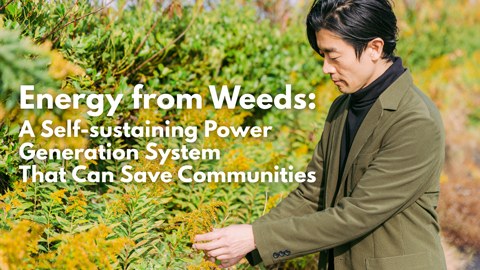When foods and beverages are produced, leftover ingredients are often discarded unused. Isn’t there a way to avoid wasting these materials, and put them to good use? We speak to a Japanese entrepreneur who was prompted by this question to start an “ethical distillery.”

Ethical Spirits’ signature brand, LAST. With a sake lees base, this gin uses a variety of ingredients for fragrance, including ginger leaves, lavender, and pink peppers.
Poverty and food shortages are on the rise globally, yet vast amounts of still-edible food are discarded uneaten. Making more effective use of food resources has been identified as a challenge that urgently needs addressing. Wasted, unused ingredients are found in all kinds of places and processes. Take the sake brewing process, for example. Sake is made by adding koji malt and water to rice, fermenting the result into a mash called moromi, then squeezing the liquid from the moromi. The remaining solids are known as sake lees, more than 36,000 metric tons of which are produced in Japan’s sake breweries every year.
“Sake lees are used in fertilizer, animal feed, and even food products due to their efficacy in regulating intestinal function,” says ONO Chikara, CEO of Ethical Spirits, a company founded in 2020 in Kuramae, Tokyo, to find valuable applications for unused ingredients. “Nevertheless, it is said that around 10% of the lees produced each year—roughly 3,600 tons—goes unused.”
YAMAMOTO Yuya, chairman and co-founder of Ethical Spirits, was running a boutique sake store when he was first approached about finding ways to utilize lees from breweries. There is a long tradition of using surplus sake lees to make shochu, a distilled spirit somewhat stronger than standard sake, but changes in market tastes and other factors have made the drink less popular today. While searching for other products that could be made with this sake-lees shochu as a base, Yamamoto took note of the popularity of craft gins—individual gins with character from smaller distilleries. Ethical Spirits found that adding various fragrances to sake-lees shochu resulted in a superbly drinkable gin.

Sake lees are byproducts of the sake brewing process. High in vitamins and amino acids, they are said to have a positive effect on beauty and health.
Gin is a very loosely defined spirit. Any kind of alcohol can be used as the base, and a huge range of scents can be added so long as juniper berries are among them. This made it feasible for Ethical Spirits to create their own craft gin by adding a variety of distinctive fragrances to shochu made from sake lees that would otherwise be discarded. This “ethical gin” started to attract notice when it won a Gold Outstanding Medal at the 2021 International Wine and Spirits Competition.
“At any given time, we have around 10 to 15 sake breweries providing us with shochu and other spirits distilled from surplus lees, which we then use as the alcohol base for our gin,” says Ono. “Working with multiple breweries ensures a stable supply of lees-based ingredients. In the five years since our founding, we’ve reused around 24 tons of sake lees.”

ONO Chikara, CEO of Ethical Spirits. The company’s head office in Kuramae, Tokyo, has a shop and bar dining area as well as a distillery.
Ethical Spirits also actively searches for ways to employ unused ingredients other than sake lees. The company makes gin from beer and sake that are past their best-by date, for example. It also adds aromas from things that would usually be discarded: ginger leaves, coffee grounds, cacao husks left over from the chocolate-making process, and spices rejected for not meeting visual requirements. On the other hand, notes Ono, “Gin is ultimately a luxury item. Inconsistent flavor can’t be allowed, so it’s important to balance sustainable production with delicious taste.”

Cacao husks are the outer skins of cacao beans, and are usually discarded during the chocolate-making process. Ethical Spirits uses them to make gin.
Ethical Spirits is currently pursuing a new project called WoodSpirits, which entails making alcoholic beverages from wood. Using a process patented by the Forestry and Forest Products Research Institute, unused timber from thinning and other forestry work will be broken down to the nano level to release the sugars it contains, which will then be fermented and distilled into spirits—a world-leading innovation.
“Using this process, we could make sugi cedar spirits, sakura spirits, spirits from thousand-year-old timber—different flavors from every kind of tree,” says Ono. “Japan has extensive forests, but its forestry industry is said to be in decline. This could provide a source of secondary income for people working in that sector.”
Ethical Spirits is currently building a major production facility in Tsukuba, Ibaraki Prefecture, for WoodSpirits and other projects. Named Tsukubane Greenhill Distillery, it will have equipment for fermenting sake lees, enabling the company to buy lees from more breweries. Once the distillery is up and running, Ethical Spirits will have as much as seven times its current production capacity.

Tsukubane Greenhill Distillery, a major production facility under construction in Tsukuba, Ibaraki Prefecture, will occupy the former gymnasium of a decommissioned elementary school.
At the same time, Ethical Spirits is preparing to bring Japanese gin to the world. “We are currently expanding into South Korea, Taiwan, and other parts of Asia,” says Ono. “We have completed our government registration in North America and intend to expand there, too, starting in California. The craft gin market is much larger outside Japan, and I sense an understanding of ethical manufacturing and sustainability in many places. Looking ahead, we’ll cultivate relationships with businesses that have previously had few connections with alcoholic beverages. Meanwhile, we’ll keep striving to find new possibilities for manufacturing overall and the culture of sake in particular.”





























